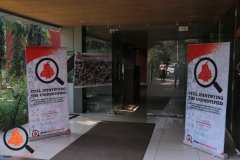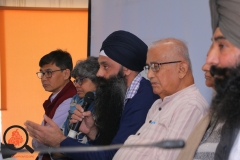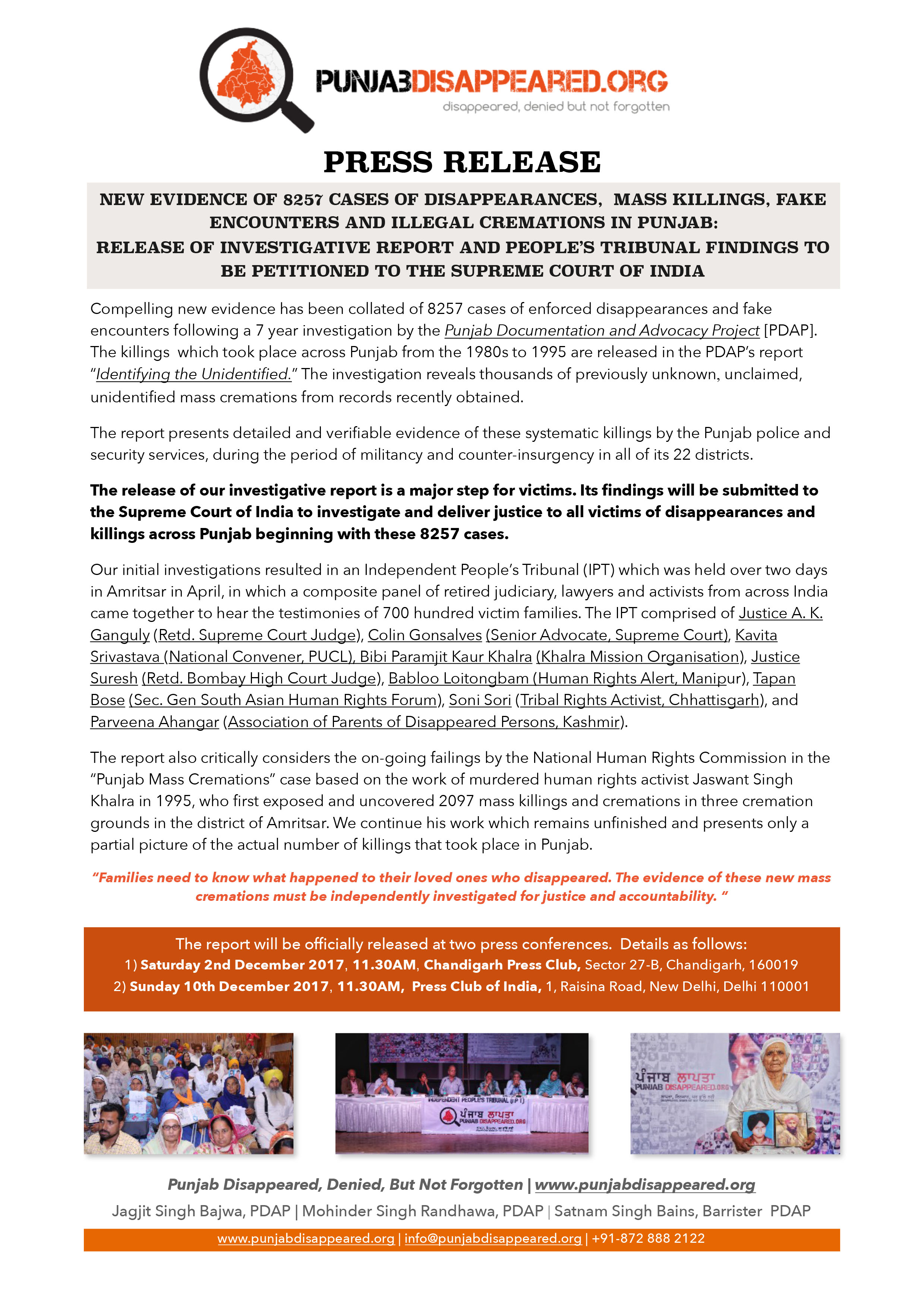Times of India – “NGO For CBI Probe Into 8,257 Going Missing During Militancy Days”
CHANDIGARH: A Punjab based non-government organization, Punjab Documentation and Advocacy Project (PDAP) has decided to approach the Supreme Court seeking CBI probe into 8,257 missing persons and those allegedly encountered during the dark days of terrorism in Punjab.
Members of the PDAP, while addressing media here at Chandigarh Press Club on Saturday, said that the organization would request the apex court to hand over the probe to the CBI like it did in Manipur’s alleged extra-judicial killing by the armed forces in July this year.
The organization claims to have carried out a study over the past seven years in which “new evidence” related to 8,257 cases of alleged enforced disappearances and fake encounters between 1980 and 1995 had surfaced. The PDAP members also claimed that in their investigation it had come out that various mass cremations were done of unclaimed and unidentified people during this period.
The PDAP members said that they had prepared the report after an Independent People’s Tribunal (IPT) meetings held over two days in Amritsar in April this year. They claimed that a number of retired judicial officers, advocates and activists from across the country had come to Amritsar to hear to the testimonies of 700 victim families of militancy period.
Read original article here.

 The Punjab Documentation and Advocacy Project (PDAP) Saturday said it will approach the Supreme Court with “verifiable evidence” of over 8,000 extra-judicial killings and enforced disappearances in Punjab during 1980-1995.The group, a part of The Independent People’s Tribunal (IPT), an outfit of human rights organisations, will also be asking the apex court to give a compensation of Rs 25 lakh to families of each of the persons who went missing, The Tribune reports.Addressing the media in Chandigarh , Justice Suresh (retired from the Bombay High Court); Satnam Singh Bains, human rights activist; Kavita Srivastava, national convener, Peoples Union for Civil Liberties; and Paramjit Kaur Khalra of Khalra Mission Organisation said they had collated compelling information of 8,257 cases of enforced disappearance and fake encounters, following a seven-year investigation.Their report “Indentifying the Unidentified” reveals unknown, unclaimed and unidentified mass cremations, which they claim is verifiable evidence of the killings by the Punjab Police and security services across Punjab.The initial investigation report was released by the group in Amritsar in April this year. A group of retired judges, lawyers and activists from across the country had then come and heard testimonies of 700 victim families. Their report also considers the recent failings of the National Human Rights Commission in the “Punjab mass cremations” case, based on the work of slain human rights activist Jaswant Singh Khalra.Satnam Singh Bains, representing PDAP, claimed that they have identified and documented hundreds of victims who were allegedly “cremated as unclaimed unidentified” and killed in “fake encounters”.
The Punjab Documentation and Advocacy Project (PDAP) Saturday said it will approach the Supreme Court with “verifiable evidence” of over 8,000 extra-judicial killings and enforced disappearances in Punjab during 1980-1995.The group, a part of The Independent People’s Tribunal (IPT), an outfit of human rights organisations, will also be asking the apex court to give a compensation of Rs 25 lakh to families of each of the persons who went missing, The Tribune reports.Addressing the media in Chandigarh , Justice Suresh (retired from the Bombay High Court); Satnam Singh Bains, human rights activist; Kavita Srivastava, national convener, Peoples Union for Civil Liberties; and Paramjit Kaur Khalra of Khalra Mission Organisation said they had collated compelling information of 8,257 cases of enforced disappearance and fake encounters, following a seven-year investigation.Their report “Indentifying the Unidentified” reveals unknown, unclaimed and unidentified mass cremations, which they claim is verifiable evidence of the killings by the Punjab Police and security services across Punjab.The initial investigation report was released by the group in Amritsar in April this year. A group of retired judges, lawyers and activists from across the country had then come and heard testimonies of 700 victim families. Their report also considers the recent failings of the National Human Rights Commission in the “Punjab mass cremations” case, based on the work of slain human rights activist Jaswant Singh Khalra.Satnam Singh Bains, representing PDAP, claimed that they have identified and documented hundreds of victims who were allegedly “cremated as unclaimed unidentified” and killed in “fake encounters”.





















































































































































































